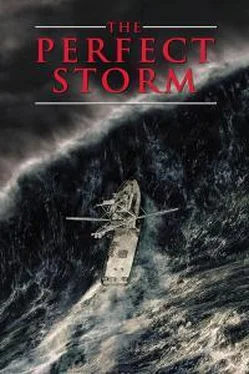Sebastian Junger - The Perfect Storm
Здесь есть возможность читать онлайн «Sebastian Junger - The Perfect Storm» — ознакомительный отрывок электронной книги совершенно бесплатно, а после прочтения отрывка купить полную версию. В некоторых случаях можно слушать аудио, скачать через торрент в формате fb2 и присутствует краткое содержание. Жанр: Триллер, Проза. Описание произведения, (предисловие) а так же отзывы посетителей доступны на портале библиотеки ЛибКат.
- Название:The Perfect Storm
- Автор:
- Жанр:
- Год:неизвестен
- ISBN:нет данных
- Рейтинг книги:3 / 5. Голосов: 1
-
Избранное:Добавить в избранное
- Отзывы:
-
Ваша оценка:
- 60
- 1
- 2
- 3
- 4
- 5
The Perfect Storm: краткое содержание, описание и аннотация
Предлагаем к чтению аннотацию, описание, краткое содержание или предисловие (зависит от того, что написал сам автор книги «The Perfect Storm»). Если вы не нашли необходимую информацию о книге — напишите в комментариях, мы постараемся отыскать её.
The Perfect Storm — читать онлайн ознакомительный отрывок
Ниже представлен текст книги, разбитый по страницам. Система сохранения места последней прочитанной страницы, позволяет с удобством читать онлайн бесплатно книгу «The Perfect Storm», без необходимости каждый раз заново искать на чём Вы остановились. Поставьте закладку, и сможете в любой момент перейти на страницу, на которой закончили чтение.
Интервал:
Закладка:
Billy's been out through the dark of the moon, which may explain his bad luck, but things start to change around the 18th. The whole fleet, in fact, starts to get into a little more fish with the approach of the full moon. Tyne doesn't tell anyone how much he's catching, but he's rapidly making up for three weeks of thin fishing. He's probably pulling in swordfish at the same rate Johnston's pulling in bigeye, five or six thousand pounds a day. By the end of the month he has 40,000 pounds of fish in his hold, worth around $160,000. "I talked with Billy on the 24th and he said he'd hatched his boat," Johnston says. "He was headed in while the rest of us were just starting our trips. You could just tell he was happy."
Billy finishes up his last haul around noon on the 25th and—the crew still stowing their gear—turns his boat for home. They'll be one of the only boats in port with a load of fish, which means a short market and a high price. Captains dream of bringing 40,000 pounds into a short market. The weather is clear, the blue sky brushed with cirrus and a solid northwest wind spackling the waves with white. A long heavy swell rolls under the boat from a storm that passed far off to the south. Billy has a failing ice machine and a 1,200-mile drive ahead of him. He'll be heading in while the rest of the fleet is still in mid-trip, and he'll make port just as they're finishing up. He's two weeks out of synch. Ultimately, one could blame some invisible contortion of the Gulf Stream for this: The contortion disrupts the swordfish, which adds another week or two to the trip, which places the Andrea Gail on the Flemish Cap when she should already be heading in. The circumstances that place a boat at a certain place at a certain time are so random that they can't even be catalogued, much less predicted, and a total of fifty or sixty more people—swordfishermen, mariners, sailors—are also converging on the storm grounds of the North Atlantic. Some of these people have been heading there, unavoidably, for months; others made a bad choice just a few days ago.
IN EARLY September, a retired sailor named Ray Leonard started asking around Portland, Maine, for a crew to help him sail his thirty-two-foot Westsail sloop to Bermuda.
Portland is a big sailing town—people race J-boats in the summer, crew on in the Caribbean in the winter, squeeze in a little skiing between seasons—and Leonard was quickly introduced to Karen Stimpson, one of the most experienced sailors in the harbor. Stimpson, forty-two, started crewing on boats as a teenager, graduated from maritime academy in her thirties, and has crossed the ocean several times on oil tankers. Between sailing trips she and another woman, Sue Bylander, thirty-eight years old, worked as graphic designers for a friend of Leonard's. Leonard offered them both a place on his boat if they would fly themselves home from Bermuda, and their boss said that they were free to take the time off if they wanted. They accepted, and a departure date was set for the last weekend in October. One month later the sloop Satori cast off from the Great Bay Marina in Portsmouth, New Hampshire, and motored slowly down the Piscataqua River toward open ocean.
The weather was so warm that the crew were in tshirts on deck and the sky was the watery blue of Indian summer. A light wind came in from the west, a backing wind. The Satori ran down the Piscataqua under power, rendezvoused with another boat, cleared Kittery Point, and then bore away to the east. The two boats were headed for the Great South Channel between Georges Bank and Cape Cod, and from there they would sail due south for Bermuda. Bylander stayed below to sort out the mountain of food and gear in the cabin while Stimpson and Leonard sat above deck and talked. Fog rolled in before they'd even cleared Isle of Shoals, and by dark the Satori was alone on a strangely quiet sea.
When Bylander finished stowing the supplies, the crew squeezed around a small dinette table in the cabin and ate lasagna baked by Stimpson's mother. Stimpson has straw-blonde hair and a sort of level, grey-eyed look that seems to assess a situation, run the odds, and make a decision all in the same moment. She's no romantic—"if you're looking for enlightenment it's not going to happen on a oil tanker"-but she's deeply in love with the ocean. She's not married and has no children. She's the perfect crew for a late-season run south.
So, Ray, have you listened to a weather forecast lately? she asked at one point during dinner.
Leonard nodded his head.
Did you hear there's a front coming through?
It shouldn't be a problem, he says. We can always cut into Buzzard's Bay.
Buzzard's Bay is at the western end of the Cape Cod Canal. One could, if the weather were bad enough, go nearly all the way from Boston to New York City by protected waterways. It's not particularly beautiful, but it's safe. "Ray was used to sailing solo, so having me on board may have made him feel more invulnerable," Stimpson says. "And there's a point at which you're so far out that you don't want to turn back, you just run offshore. In the future I will listen to the weather forecast, I will decide, as crew, whether I'm willing to keep sailing. It will be immaterial to me the level of experience of the owner-captain."
The date was October 26th. The lives of Stimpson, Bylander, and Leonard were about to converge with several dozen others off the New England coast.
BILLY, like Leonard, has undoubtedly heard the forecast, but he's even less inclined to do anything about it than Leonard is. The lead time for an accurate forecast is only two or three days, and it takes twice that long for a sword boat to make port. Weather reports are vitally important to the fishing, but not so much for heading home; when the end of the trip comes, captains generally just haul their gear and go. Because errors compound, the longer the trip, the more careful the captain has to be when he sets his initial heading for home. An error of just one degree puts a boat thirty miles off-course by the time she gets back to Gloucester; a captain could add a day to each trip with a month of such errors. When Billy Tyne starts for home, a bearing of 260 degrees would run him straight into Cape Ann, but it would also shave too close to Sable Island, which presents a ghastly hazard to shipping. ("I try to avoid it by at least forty or fifty miles," says Charlie Reed.)
The channel between Sable and Nova Scotia is blessed with a good, cold countercurrent that starts in Labrador and hugs the coast all the way down to Hatteras, but for some reason Billy decides not to take it. He decides to cross the Tail around 44 degrees north— his "waypoint"—and then, once clear of Sable, shoot a course almost due west for Gloucester.
Fishing boats use a global positioning system for bluewater navigation. GPS, as it's called, fixes a position relative to military satellites circling the earth and then converts it to longitude and latitude. It's accurate to within fifteen feet. The Department of Defense intentionally distorts the signals because they're worried about the misuse of such precise information, but the standards of accuracy on a sword boat are loose enough so that it doesn't matter. Fishermen generally use GPS to back up a loran system, which works by measuring the time it takes for two separate low-frequency radio signals to reach the vessel from broadcasting stations on shore. Charts are printed with numbered lines radiating out from the signal sources, and a loran reading identifies which lines correspond to the vessel's position.
Even with two electronic systems, though, mistakes happen—iron-bearing landmass, electrical interference, all kinds of things skew the output. Furthermore, the plotter gives you a pure direction, as if you could slice right through the curvature of the earth, but boats must follow an arc from point to point—the "Great Circle" route. The Great Circle route requires a correction of about eleven degrees north between Gloucester and the Flemish Cap. On the night of October 24th, Billy Tyne punches in the loran coordinates for his waypoint on the Tail of the Banks and reads a bearing of 250 degrees on his video plotter. On a Great Circle route, the compass heading and the actual heading are identical at the start of a trip, gradually diverge until the halfway point, and then converge again as the boat nears its destination.
Читать дальшеИнтервал:
Закладка:
Похожие книги на «The Perfect Storm»
Представляем Вашему вниманию похожие книги на «The Perfect Storm» списком для выбора. Мы отобрали схожую по названию и смыслу литературу в надежде предоставить читателям больше вариантов отыскать новые, интересные, ещё непрочитанные произведения.
Обсуждение, отзывы о книге «The Perfect Storm» и просто собственные мнения читателей. Оставьте ваши комментарии, напишите, что Вы думаете о произведении, его смысле или главных героях. Укажите что конкретно понравилось, а что нет, и почему Вы так считаете.












